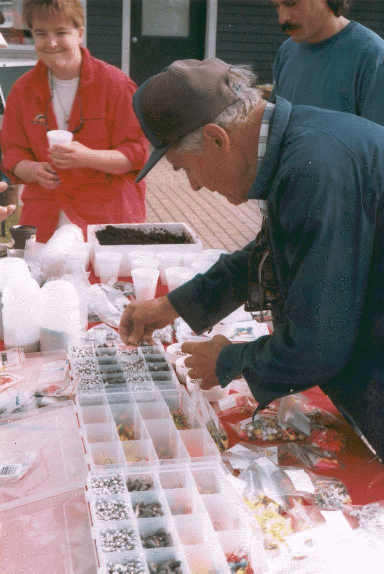Banning Lead For Outdoor Sporting
| HOME |
| ALTERNATIVES TO LEAD TACKLE AND SHOT |
| LEGISLATION |


|
To Complete a Form Letter Supporting the Ban on Lead Sinkers |
To Complete a Form Letter Opposing the Ban on Lead Sinkers |
|
To Contact U.S. Senator - Vermont Patrick Leahy |
To Contact U.S. Senator - Vermont Jim Jeffords |
Exchange Programs in Vermont
Vermont has embarked on a public education campaign to convince anglers to use alternatives to lead. The Vermont Fish and Wildlife Service sets up displays at more than a dozen state parks, tackle shops and fishing events (see Figure 1). These displays aim to educate anglers about the hazards of lead and allows them to exchange their lead sinkers for nontoxic steel ones. This program has persuaded citizens from Vermont to turn in over 15, 000 lead sinkers and jigs in exchange for new environmentally friendly weights (VFW 2004).
Figure 1. Lead Exchange Program (Hudolin 2004).

During the summer of 2003, I mentored a young child who tried to educate the citizens of the Northeast Kingdom about the harmful effects lead can have on our environment. Anglers were given tin sinkers in exchange for lead. They reported that their fishing had not been diminished in any way, but the use of a much-larger sinker, to match the weight of lead made it more difficult while casting. Also, some opposition was reported because of increased future costs for weights.
Many anglers make their own lead sinkers within their homes. These people are exposed to minor lead hazards and care should always be exercised. To learn more about ways to reduce exposure visit the Canadian Guide to LureMaking website.
Attention Anglers! Exchange your lead sinkers for non-toxic sinkers free of charge through the National Wildlife Federation's sinker exchange program, in conjunction with the Vermont Institute of Natural Science and the Vermont Department of Fish and Wildlife's Nongame and Natural Heritage Program (Fowle and Hanson 2003).
Lead Sinkers may be swapped for non-toxic sinkers at these Vermont locations:
|
Barnard
General Store, Barnard – 234-9688 Chapman’s
Store, Fairlee
– 333-9709 Chipman
Point Marina, Orwell – 948-2288 Champlain
Bridge Marina, Addison – 800-729-2469 Classic
Outfitters, South Burlington – 860-7375 Elmore
Store, Lake Elmore – 888-2296 Evansville
Trading Post, Brownington – 754-6305 The
Fishing Hole, Morrisville – 888-6210 The
Great Outdoors, Newport – 334-2831 Lindholm
Sport Center, Rutland – 773-6000 Lotus
Lake Camp, Williamstown – 433-5451 Mart’s
Sporting Goods, Poultney – 287-9022 The
Moorings Marina, Colchester – 862-1407 The
Morgan Country Store, Morgan – 895-2706 North
Country Bait and Tackle, Swanton – 868-7843 North
Hero Marina, Inc., North Hero – 372-5953 Northern
Exposure Country Store, Westmore – 525-3789 Northern
Wildlife Taxidermy, Island Pond – 723-6290 Quimby
Country, Averill – 822-5533 Ralph
and Joan’s Bait Shop, Mt. Holly – 259-3349 Tom’s
Bait and Tackle Shop, Bomoseen – 265-8654 Village
Sport Shop, Lyndonville – 626-8448 Well’s
Village Store, Wells – 645-0332 Willey’s Store, Greensboro – 533-2621 |
Or the following State Parks throughout Northeastern Vermont:
|
Bomoseen, Brighton, Burton Island, Camp Plymouth, Grand Isle, Green River Reservoir, Maidstone, and Stillwater. |
|
For further information, please contact Margaret Fowle at the National Wildlife Federation's Northeast Natural Resource Center at (802) 229-0650, or Eric Hanson, VINS loon biologist at (802) 586-8064. Thank you for helping to conserve our precious wildlife resources! |
| BACK TO JSC STUDENT PAGES |
| MY RESUME |
| EMAIL ME |
